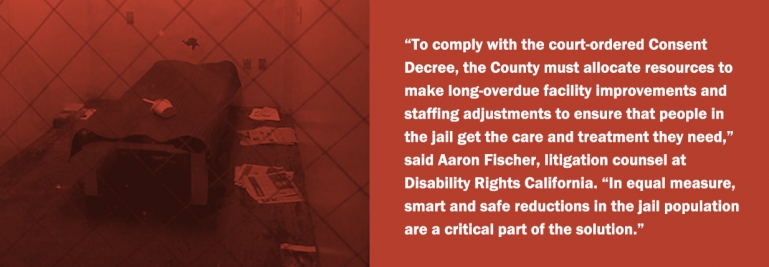Settlement Approved in Sacramento County Jail Class Action to Ensure Better Treatment of People with Disabilities and Reform Solitary Confinement Practices

Settlement Approved in Sacramento County Jail Class Action to Ensure Better Treatment of People with Disabilities and Reform Solitary Confinement Practices

(Sacramento, CA) On January 13, 2020, on behalf of the nearly 3,700 people incarcerated in Sacramento County’s jails, Disability Rights California, Prison Law Office, and Cooley LLP secured final federal court approval of a settlement with the County to address the dangerous and unconstitutional conditions of the County’s jails. The settlement of this class action lawsuit, Mays v. County of Sacramento, E.D. Cal. No. 2:18-cv-02081-TLN-KJN (PC), resulted from an extensive investigation into jail conditions and years of intensive negotiations with the County.
The lawsuit alleged that Sacramento County failed to provide constitutionally required mental health and medical care to people in the jail, employed harsh and extreme forms of solitary confinement, failed to implement essential suicide prevention measures, and discriminated against people with disabilities.
“Like many counties across the state, Sacramento County failed to allocate the resources necessary to provide humane conditions in its jails. Sacramento County drew our attention in particular because of the woefully inadequate mental health care system in its jails and its excessive use of solitary confinement,” said Margot Mendelson, staff attorney at the Prison Law Office.
The class action complaint detailed the jails’ practice of locking hundreds of people alone in dark, cramped, locked cells for 23.5 hours per day. It described the jails’ persistent practice of using spaces unfit for human habitation to house people in psychiatric crisis. The complaint described dangerous deficits in staffing throughout the jails.
The settlement between the parties requires the County to significantly expand its mental health services, revamp its medical care system, implement improved suicide prevention measures, and ensure that people with disabilities have the accommodations they need and can access jail programs and services. The County will be subject to the terms of the consent decree for at least five years, and its compliance with the settlement will be monitored by independent court-appointed experts and Plaintiffs’ class counsel.
Throughout the case, class counsel has pressed the County to take steps to meaningfully reduce the number of people who end up in jail. The consent decree commits the County to consider measures to reduce the jail population and to “prevent the unnecessary or avoidable incarceration of individuals with serious mental illness.” Under the settlement agreement, the County has agreed that a “reduction in the jail population is a cost-effective means to achieve constitutional and statutory standards.”


The Sheriff’s Department has begun to take steps to improve conditions in the jails, including through the development of an Intensive Outpatient Program designed to provide expanded mental health care programming to people with serious mental illness in the jails, and by ending the placement of people in psychiatric crisis in inappropriate “multipurpose rooms.”
“Full implementation of the consent decree will result in fundamental and necessary improvements in how our clients are treated in Sacramento County’s jails, from ending the dangerous misuse of solitary confinement to improving access to essential health care,” said Jessica Valenzuela Santamaria, an attorney at Cooley.
“This settlement demonstrates a commitment by the Sheriff’s Department and the County to improve jail conditions and move towards safer and more humane jails in Sacramento County,” said Ms. Mendelson of the Prison Law Office. “We look forward to seeing positive results for our clients.”
A copy of the Consent Decree is available at: https://www.disabilityrightsca.org/cases/mays-v-county-of-sacramento
Disability Rights California (DRC) - Is the agency designated under federal law to protect and advocate for the rights of Californians with disabilities. The mission of DRC is to advance the rights, dignity, equal opportunities, and choices for all people with disabilities. For more information visit: https://www.disabilityrightsca.org.
Cooley - Clients partner with Cooley on transformative deals, complex IP and regulatory matters, and high-stakes litigation, where innovation meets the law. Cooley has 1,000+ lawyers across 15 offices in the United States, Asia and Europe. For more information visit: www.cooley.com
The Prison Law Office - Is a non-profit public interest law firm that protects the rights of people incarcerated in correctional facilities. For more information visit: www.prisonlaw.com.





